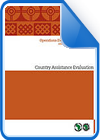Evaluation Team
This report was prepared by a co-ordinated by Mr H. Razafindramanana team, Evaluation Task Manager, and composed of Mr M. LABIDI Consultant and Mr. J. MOUANDA, Evaluation Officer.
Objective
The objective of this evaluation is to analyze the effectiveness of Bank assistance to the country during the period 1996-2007 and its impact on development, to draw conclusions, lessons and recommendations for its current and future actions. During the reporting period, four Country Strategy Papers (CSPs) have been developed by the Bank to guide its operations.
Main Lessons
- Adequate policies aimed at reform, good governance, development based on poverty reduction, and increased mobilization of external resources.
- Ownership of Bank programmes by the government and beneficiaries ensures and increases their effectiveness.
- The persistence of environmental and economic vulnerabilities confirms the need for a long-term transformation policy to gradually address the problem, taking into account problems specific to island countries.
- Conditions for budget support loan effectiveness include donor coordination in a common framework and government ownership of reforms.
- Help with project preparation, selection of appropriate conditionalities and strengthening of project management teams help ensure the smooth launching and successful implementation of projects.
- Selectivity and intervention at the appropriate time in the strategy’s priority areas ensure the effectiveness of the Bank’s assistance.
Main Recommendations
Recommendation (s) for the Bank:
- Formulate the next Bank CSPs and programmes on the basis of the PRGSP II and of other government programmes by focusing on infrastructure (energy), governance, the private sector, the environment and human resources (vocational education).
- Taking into account the country’s vulnerabilities, despite its reclassification as a “middle income country”, reclassify Cape Verde as a “blend country” with access to both ADF concessional resources and the ADB window.
- Strive for synergy in all interventions with respect to both concessional and nonconcessional resources.
- Take into account the economic vulnerability as resource allocation criteria of the Bank Group.
- Carry out more economic and sector studies to strengthen focus on actions, in particular, a study on the sustainable development of small insular states, in order to draw from this study and from the ongoing study on the costs of insularity useful lessons for preparation of the Bank’s policy for small insular countries.
- Strengthen efforts to mobilize the country team in designing and monitoring budget support programmes to increase the Bank’s involvement in priority areas of the joint budget support matrix.
- Improve the quality at entry of projects by taking into account country specificity and ensuring adequate allocation of financial and human resources to allow quick fulfilment of launching conditions.
- Encourage increased pro-activity by the private sector, the government and the Bank’s Private Sector Department to promote the private sector, notably by organizing an exploratory mission to Praia by the Bank’s Private Sector Department.
- Strengthen the Bank’s field presence by assigning a programme officer onsite to better address language and communications problems.
- Continue to support the strengthening of the monitoring-evaluation system, which is not yet efficient.
File(s):
| Attachment | Size |
|---|---|
| 46.81 KB |


